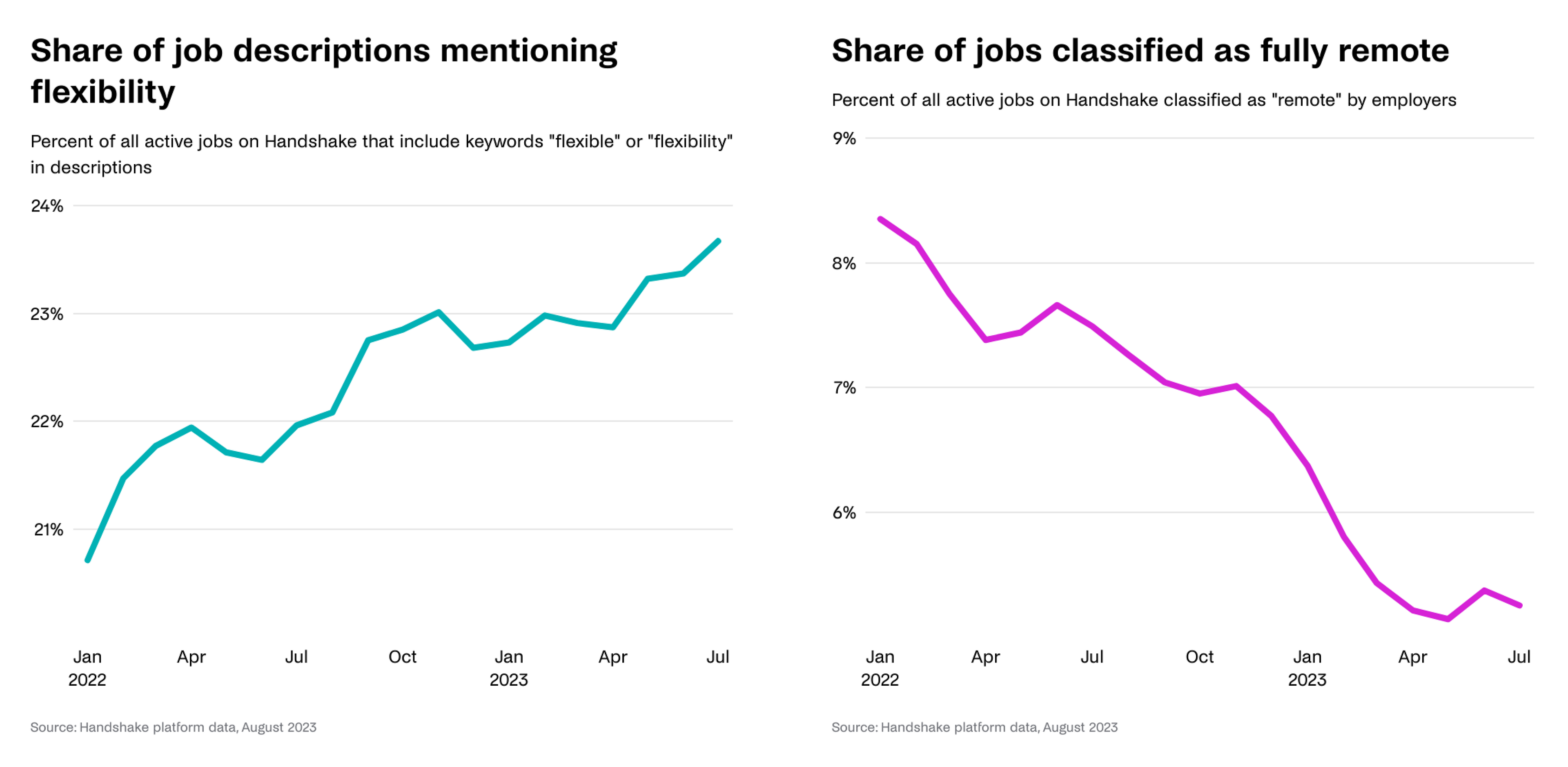Today’s students and new grads have a unique perspective on remote work and flexibility. Learning and working remotely isn’t novel to them—they’ve navigated their share of Zoom classes and remote internships, and they’re clear-eyed about the pros and cons. And after having their college experience disrupted by the pandemic, they’re craving both in-person interaction and sustainable work-life balance.
As a result, at a time when many people think of remote work and flexible work as one and the same, this generation’s priorities are more nuanced. Benefits like being able to set their own schedule are often as or more important to them than the option to work from home.
Not every employer can offer remote work. But any employer can appeal to this new generation of talent by broadening their definition of flexibility and getting creative about the flexible work benefits they can offer. Our research reveals four things all employers should keep in mind:
- Most early-career professionals want to work in person at least some of the time. Of students on Handshake who say remote work is an option in their field, only 14% would prefer a fully-remote role.
- Remote work matters less to early talent than other forms of flexibility. For example, 71% of students are more likely to apply to a job with a flexible schedule, compared to just 37% who are more likely to apply to a job with hybrid work options.
- Early talent believes both remote and in-person work can support productivity and well-being. Two thirds of students say they can produce high-quality work in both remote and in-person settings, and more than half say work-life balance can be a benefit of either remote or in-person work.
- Identity plays an important role in shaping remote and in-person work experiences. For example, women are less likely than men to say opportunities for training, mentorship, and advancement are benefits of in-person work.
Read on for a deeper dive into each of these insights.
Most early-career hires want to spend time in the office
Our research over the past year has consistently shown that students and new grads prefer hybrid work. In our latest survey, 75% of students who plan to work in fields where remote work is an option said they’re hoping for a job with a hybrid schedule, while only 14% said they’d like to be fully remote.
I am a strong believer that working in a quality environment is essential to happy, healthy, and productive workers. I think that involves both the peaceful environment of remote work and the structured and collaborative environment of in-person work.
Communications major, Class of 2025
It’s also important to remember that remote work simply isn’t possible in many fields. About 40% of students on Handshake plan to pursue jobs that typically require in-person work, such as certain roles in education, healthcare, agriculture, or transportation. These students fully expect to work in person, and it’s likely that for many, in-person work aligns with their strengths and the types of roles they’re excited about.
Early talent values other forms of work-life flexibility above remote work
Flexibility can mean many things. For some early-career professionals, the option to work remotely may be an important part of what makes a job feel “flexible”—but for most, other aspects of work-life flexibility matter more than remote or hybrid work.
When asked about the factors that motivate them to apply for certain jobs, for example, 71% of students say they’d be more likely to apply for a job with a flexible schedule. That’s compared to just 21% who would be more likely to apply to a fully remote job, and 37% who would be more likely to apply to a job that offered hybrid work options.
I feel like I work best on my schedule, which differs from normal work hours…I’m most productive around late afternoon/evening, and I don’t work as well or as quickly in the morning. So flexibility of my own work hours will not only benefit me, but also the company I work for.
Social sciences major, Class of 2026
Our data also shows that early-career talent cares less about flexibility for flexibility’s sake, and more about whether an employer’s policies support them in pursuing interests and priorities outside of work. For example, only about a third of students say it’s very important that they’re able to set their own work hours—but more than two thirds say it’s very important that they’re able to find time for hobbies and step away from work as needed to handle personal responsibilities.
During COVID, my generation was online all day, sitting all day, and that really does take a toll. I think that’s part of why we want to be able to go to the gym or take a day off to unwind. I’ve noticed that a lot of people don't want to stick to the old-fashioned nine-to-five anymore…I think we can normalize not spending our whole lives just doing nine to fives, and actually living our lives while we can.”
Global and Community Health major, Class of 2024
Early talent believes both remote and in-person work can support productivity and well-being
When it comes to productivity, work-life balance, and opportunity to advance, most early-career professionals don’t think remote or in-person work is necessarily better. Rather, they see benefits to both—which may explain why so many prefer a hybrid schedule.
However, early talent does believe in-person work is better for collaboration and relationships with colleagues. More than half of students on Handshake say increased opportunity to collaborate is a clear benefit of in-person work, and two thirds say the same of the ability to build stronger relationships.
Relationships with my coworkers are very important to me. I want to work somewhere where I feel like my coworkers are my friends. Working remotely takes away the personable conversations with coworkers during lunchtime and in passing, and I enjoy meeting people in the company that I do not work with directly, which being in person allows me to do.
Engineering major, Class of 2025
Race and gender play an important role in shaping in-person work experiences
Although most women and students of color want to work in person at least some of the time, their feelings about in-person work differ in several important ways. Black and Hispanic or Latine students, in particular, are less likely than white students to say it’s easier to collaborate and build relationships in person, and less likely to believe working in person will result in more opportunities for training and mentorship, which may help to explain why they are often more likely to prefer remote work.
Likewise, women are less likely than men to believe working in person will benefit their careers. Only 21% of women say opportunity for recognition and advancement is a clear benefit of in-person work, compared to 31% of men. For employers looking to create fair and effective return-to-office strategies, these differences point to the importance of ensuring in-person work environments are inclusive and offer equal benefit to all employees.
The future is flexible
On Handshake, we see more and more employers beginning to adapt to Gen Z’s flexibility preferences. The share of fully-remote roles on our platform has declined steadily over the past year, and remote roles now account for only about 5% of active job openings. At the same time, however, mentions of flexibility in job descriptions have increased. About 24% of jobs on Handshake nodded to flexibility in their descriptions as of July 2023, compared to around 18% in January 2020.

The future of remote work is still uncertain. What is clear, though, is that students and new grads want their employers to take a more holistic approach to flexibility. Any employer can offer flexibility benefits that appeal to this new generation of talent, and employers that embrace an expansive definition of flexible work will have a big advantage when it comes to attracting early-career hires.
Methodology
Student sentiment surveys
Between June 26–July 12, 2023, Handshake randomly invited students across the platform to participate in an online survey. After cleaning, 2,617 students pursuing bachelor's degrees completed the survey.
Survey weighting
In order to provide a more representative snapshot of student sentiment across four-year college students in the US, survey responses were weighted by gender, race and ethnicity, and selectivity using institutional enrollment numbers from federal NCES datasets.
Job description data
To determine change in the share of job descriptions mentioning flexibility, Handshake analyzed full-time job descriptions that were active in a given month on the Handshake network between 1/1/2022 to 7/1/2023.
